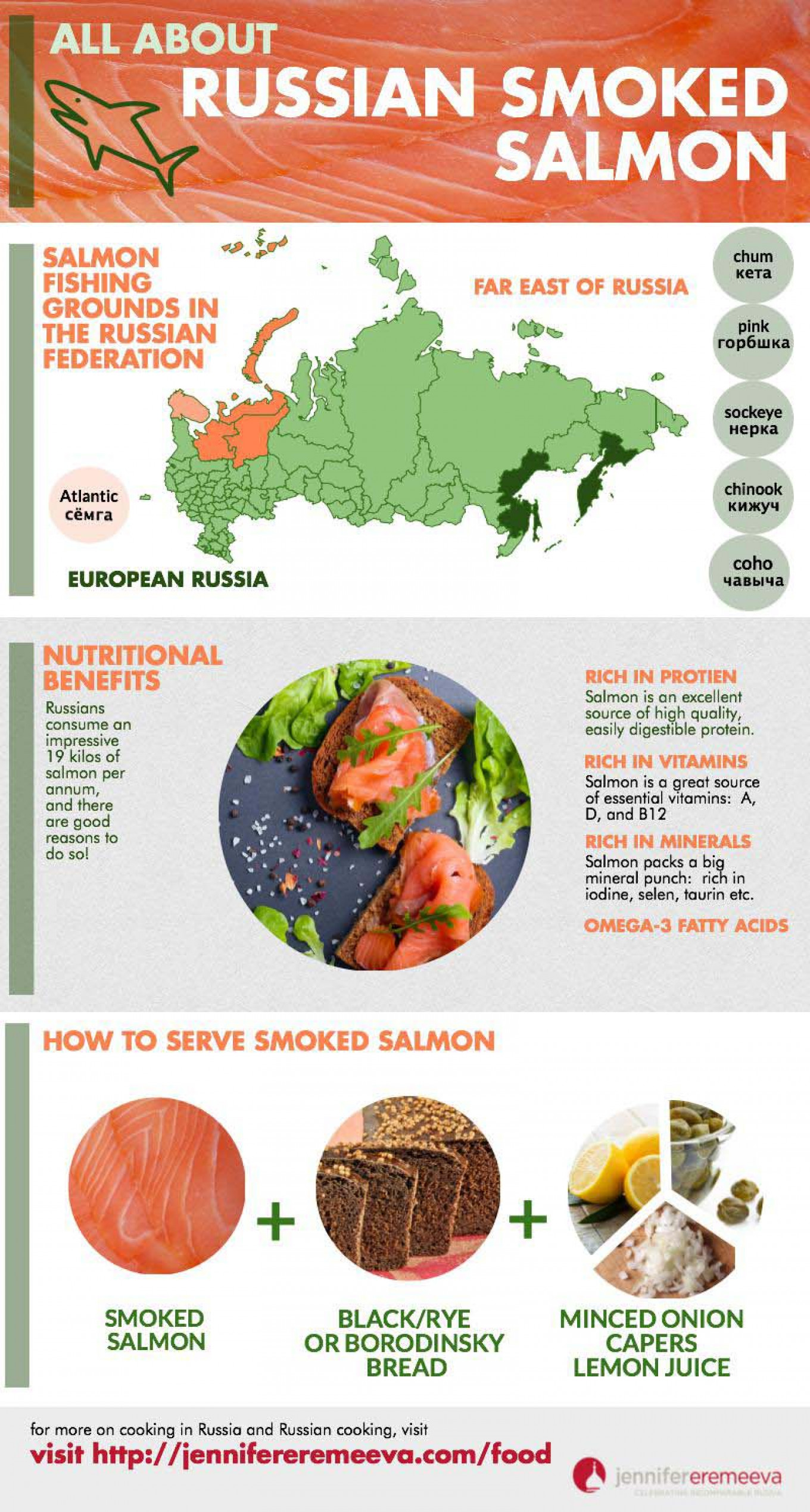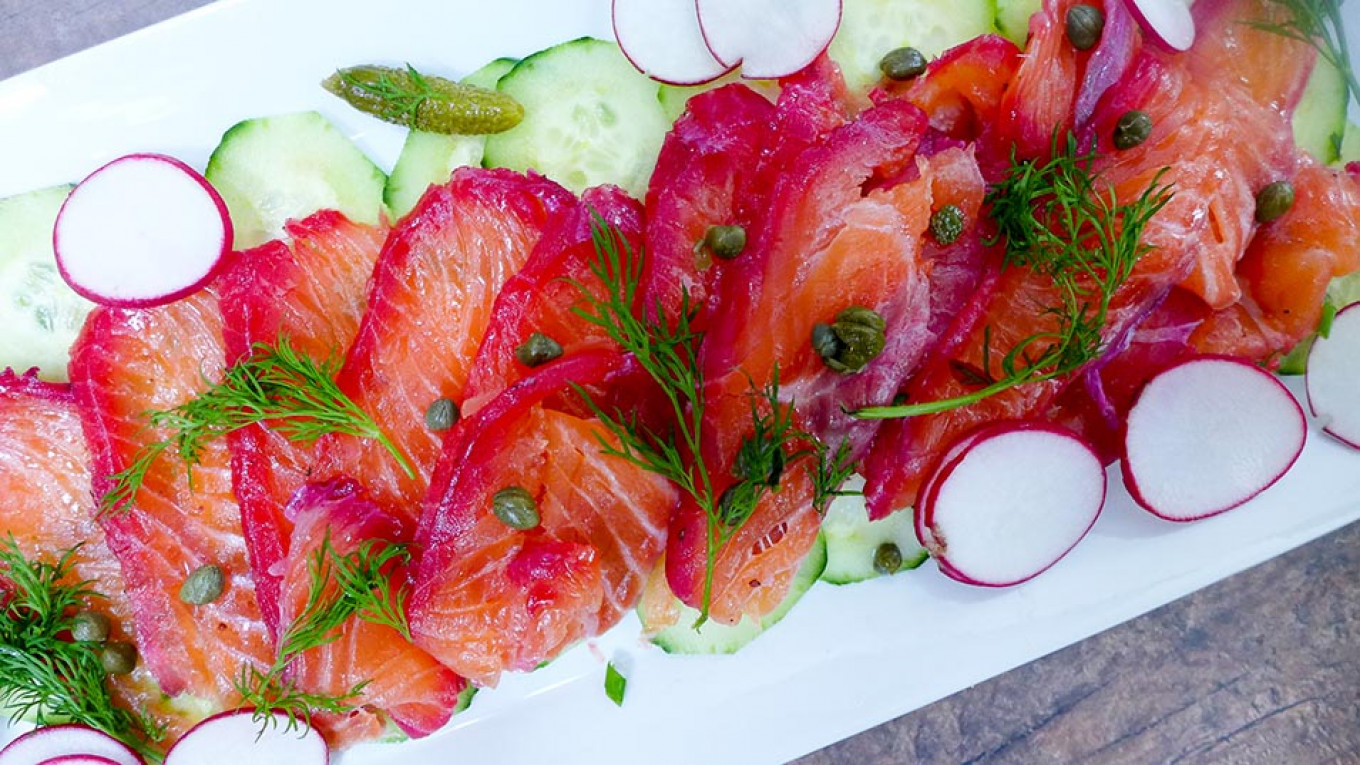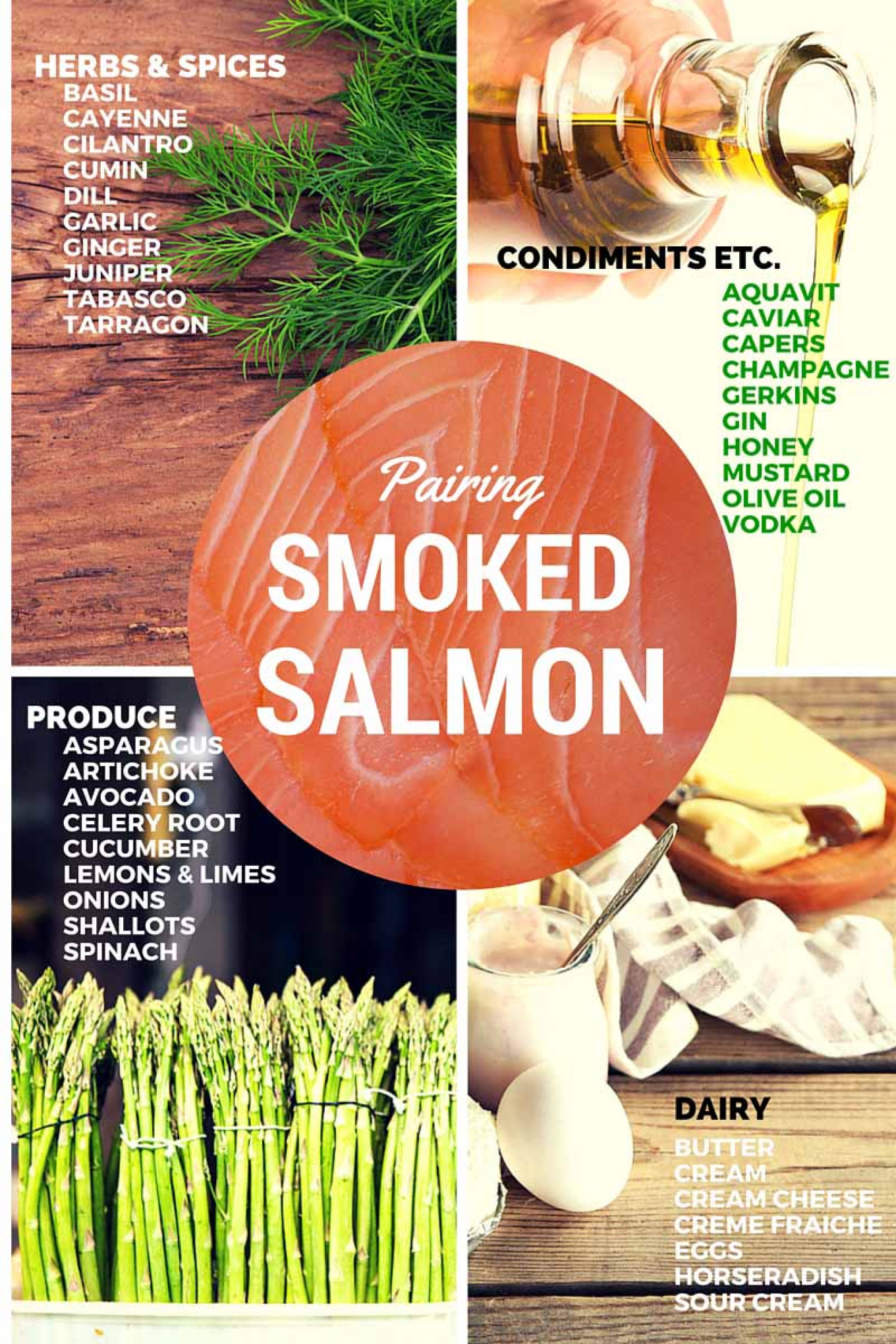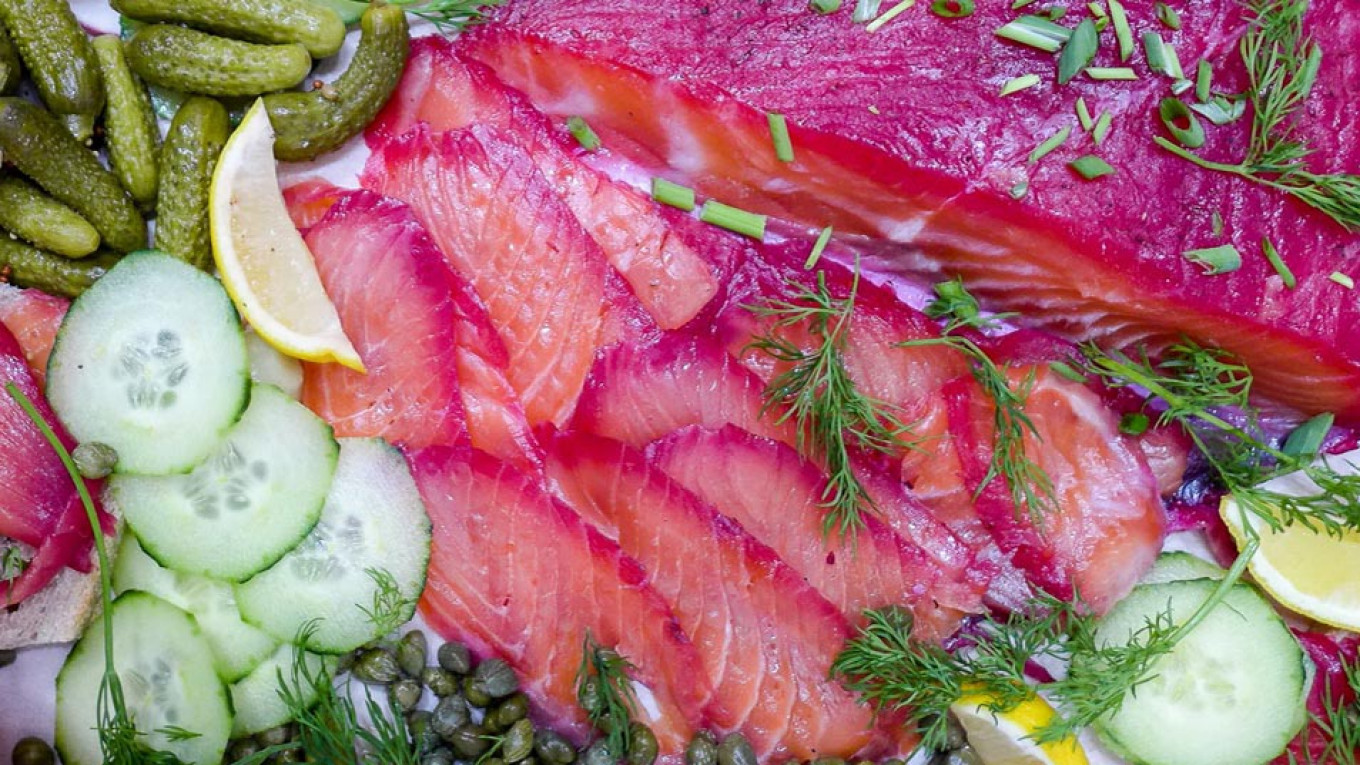I’m having a hard time getting into a holiday mood this year. The final blow of a nasty bout of bronchitis has left me in no mood to deck the halls. The only saving grace is that as a freelancer, I am no longer obliged to drag myself to a Russian office party — the dreaded korporativ — but the bad news is that December shall not pass without organizing a large and festive gathering.
What I need is a dish that is both festive and ridiculously easy to make: Beet & Horseradish Cured Salmon. It’s delicious, it’s flashy, and it gives more than a nod to our Lord and Savior’s ethnic origins. A side of salmon, a few pickled sundries, some chopped onion, a loaf of Borodinsky bread, a bottle of vodka and fa-la-la-la-la, you have a festive board worthy of the season.
It’s also one of those invaluable recipes that practically cooks itself.
Salmon: Russia’s pink gold
Salmon is plentiful in both of Russia’s oceans: the Atlantic and the waters of Russia’s Far East yield tons of pink, sockeye, Coho, and chum salmon. Russians have long regarded salmon as a major source of nutritious protein and are masters at preserving it in all manner of delicious ways.
Curing, salting, and smoking fish are age-old techniques, harkening back to earliest recorded culinary history. Thanks to the mighty rivers that bisect Russia, fish was a major staple of the Russian peasant diet, and the taste for it has not disappeared over the ensuing millennia: Russia’s colorful farmers’ markets are a great place to purchase preserved fish, which accounts for a whole separate section of any retail food establishment. I can often make a meal of the small slivers the market salesmen press on me, and from them I have learned the subtle differences between the fish and the way they were cured.
Once you get over the optics of stacks of oily fish skins, a wonderful world of flavor awaits. My husband loves smoked fish plain with several bottles of beer, but I like to sneak preserved fish into all kinds of dishes. Preserved fish can turn a lackluster dish of dauphinoise potatoes into a meal and bring intense flavor to creamy fish soup, while cured salmon can elevate any winter salad, grain bowl, or sandwich into a special meal.

Smoked versus cured salmon
Smoked (копчёная) salmon is brined and then smoked at a low temperature (no more than 99ºF) for at least 12 hours. This can be accomplished on a grill with some special equipment, but the best smoked salmon comes from special smokehouses, where the salmon sides are hung from the ceiling, and the smoke and fire are banked in a separate part of the structure.
Cured (солёная) salmon, on the other hand, is not so much a recipe as a technique, and one easily executed in any home kitchen. All you need is fish, salt, sugar, spices, and some kind of alcohol, which in Russia means vodka. Artisanal hipsters in Brooklyn may use gin these days, but if you live in Russia and you have a bottle of Bombay lying around, you know very well that using it as a curing agent is just four hundred kinds of wrong. Put it in a glass with some olives for heavens’ sake. It’s gin o’clock somewhere, right?
It was definitely gin o’clock when I put on some Christmas carols and rapidly assembled my Beet & Horseradish cure. The addition of these workaday Russian ingredients, when combined with a knob of fresh ginger and a complimentary spice rub, not only give the salmon a lovely purple outer layer but also add considerable zing and a surprising complexity and depth of flavor.

Beet &Horseradish Cured Salmon
Ingredients
- 1 kilo of wild salmon - ideally a long “side” but a chunk will also do; leave the skin on
- 1 Tbsp caraway seeds
- 1 tsp chili flakes
- 2 tsp dill seed
- 2 tsp allspice berries
- 1 Tbsp ground sumac
- 2 Tbsp orange zest
- 1 Tbsp pink peppercorns
- 1 Tbsp grated fresh ginger
- 1 Tbsp prepared horseradish
- 240 ml shredded beetroot
- 200 grams kosher salt or coarse non-iodized sea salt
- 100 grams sugar
- 75 ml vodka or aquavit
- A generous handful of chopped dill and more to garnish
Instructions
- In a clean skillet, over medium heat, combine the caraway seeds, peppercorns, chili flakes, dill seed, sumac, and allspice berries, and toast them for 3 minutes, taking care that they do not scorch. Grind in a spice grinder or with a mortar and pestle. Set aside.
- Remove the bones from the side of fish using tweezers. Trim the skin of all white fatty deposits.
- Place the fish in a shallow, non-reactive baking dish, on top of a layer of parchment paper or plastic wrap. Rub the flesh side of the fish with the spice mixture.
- Toss the sugar, salt, orange zest, grated beets, ginger, horseradish, dill, and vodka. It should be the consistency of wet sand.
- Pack the sugar mixture around the fish: bottom, top, and sides. Then wrap the fish tightly with several layers of plastic wrap.
- Weight the fish down with a platter or baking sheet — something that will cover the area of the fish completely. Then weight the top baking sheet down with tins or bottles so that there is sufficient pressure on the top.
- Place the fish to cure in the refrigerator for 48 hours. When the fish is cured, gently brush off the cure from the fish — do not rinse— and wrap in fresh plastic if not serving immediately. The fish will keep for up to a week in the fridge if well wrapped.
Technique adapted from Bon Appetit
Serving cured fish
Anyone who’s ever gone to the theater in Moscow knows that Russians tend to serve their fish in a truly heinous manner: a thick slab of salmon slapped on a very stale piece of white bread, thickly coated with mediocre butter. When coupled mediocre warm champagne and a kilometer-long line out the ladies room, this presentation never fails to enrage!
To truly enjoy cured salmon, you need to cut it very thinly, on a shallow diagonal using a long, flat knife, moving against the grain to create pieces that are as wide as the side of salmon and as deep as you can make them. Nothing beats Russia’s lovely coriander-infused Borodinsky bread as the base layer; thinly sliced, the rich, tangy bread provides a perfect foil to the meaty, salty fish. If you don’t live in Russia, use pumpernickel or whole wheat granary bread.
I don’t think dairy is a must, but if you are going in for it, make sure it’s excellent quality. You can use butter, cream cheese, creme fraiche, Russian sour cream, or even tvorog. If you are feeling ambitious, spike your dairy with more horseradish, fresh chives, or dill. Thinly-sliced cucumbers and radishes provide a nice crisp flavor and textural foil to the richness of the salmon. To amplify the taste, serve with a bit of chopped onion and/or small pickles or capers, with lemon slices to spritz on a bit of citrus just before serving. Top it with a sturdy grind of black pepper, and hey…it’s beginning to look a lot like Christmas!
Jennifer Eremeeva writes about Russian history, culture, and cuisine. You can follow her on Twitter @JWEremeeva.

A Message from The Moscow Times:
Dear readers,
We are facing unprecedented challenges. Russia's Prosecutor General's Office has designated The Moscow Times as an "undesirable" organization, criminalizing our work and putting our staff at risk of prosecution. This follows our earlier unjust labeling as a "foreign agent."
These actions are direct attempts to silence independent journalism in Russia. The authorities claim our work "discredits the decisions of the Russian leadership." We see things differently: we strive to provide accurate, unbiased reporting on Russia.
We, the journalists of The Moscow Times, refuse to be silenced. But to continue our work, we need your help.
Your support, no matter how small, makes a world of difference. If you can, please support us monthly starting from just $2. It's quick to set up, and every contribution makes a significant impact.
By supporting The Moscow Times, you're defending open, independent journalism in the face of repression. Thank you for standing with us.
Remind me later.







